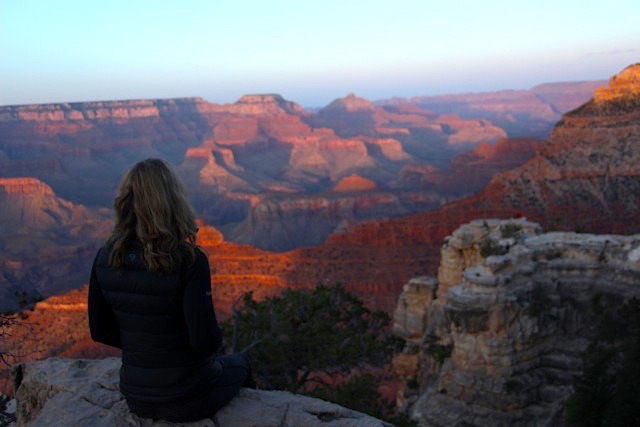“I wanted a perfect ending. Now I’ve learned, the hard way, that some poems don’t rhyme, and some stories don’t have a clear beginning, middle, and end. Life is about not knowing, having to change, taking the moment, and making the best of it, without knowing what’s going to happen next. Delicious Ambiguity.” ~ Gilda Radner
None of us could have expected the uncertainty that 2020 would bring. Maybe you thought – as I did – that 2020 would be your year. A fresh decade. A clean slate of possibilities.
I miss that former version of myself. The one who made plans and saw friends and felt confident about the future of her work.
The person who hadn’t experienced a pandemic, who wasn’t facing a wave of economic and circumstantial dominos – in both her personal and professional life.
Uncertainty feels awful. It’s like you’re hiking on a trail and a cavernous ravine opens up on the path immediately in front of you. You can see where you had planned to go, but it’s physically impossible to get there. You have to adapt, rethink, and reorient all while juggling emotions like shock, sadness, frustration, and fear.
Uncertainty is exhausting, and as humans, we are hard-wired to want answers, to eliminate the distress of the unknown. In a 1972 study on motives and development, psychologist Jerome Kagan found that uncertainty resolution was one of the biggest determinants of human behavior. In short – certainty is something we crave.
Even though moments of uncertainty will continue to blindside us, we can strengthen our resilience so uncertainty becomes easier to navigate. We might even get to a place where we see uncertainty and possibility as two sides of the same coin.
So, where do we begin? Here are a few practices that have helped me in the past, and might help you as you find ways to cope with and navigate uncertainty:
- Perspective. When the wave of uncertainty crashes over us and we find ourselves flailing through the undertow, it’s important to remember that the wave won’t last forever. A phrase that became my personal mantra through cancer treatment was, “This is not my permanent reality.” Even if we don’t know exactly where things are going (and there is always the chance they will get worse), we won’t remain in our current state of shock and confusion forever.
- Curiosity. When the world feels upside down and nothing makes sense, emotions can overwhelm us. But, the ability to pause and get curious about what’s really going on can help us move through grief to possibility. Try to channel an inner detective instead of an inner critic with questions like, “What am I really sad about?” “What am I really afraid of?” “What could I do in a worst-case-scenario situation?”
- Connection. The only thing worse than uncertainty is the feeling of facing the unknown alone. It can feel tempting to retreat into ourselves and shut out the world, but it is in moments of loss or fear that we have the biggest opportunity to build connections. Whether you show up and listen compassionately to someone else who is struggling or open up about your feelings with a friend or family member, a sense of community can make uncertainty more manageable.
- Possibility. We need to give ourselves permission to grieve the possibilities that we’ve lost in the midst of this uncertainty. It’s ok to feel emotional, to cry, to yell, or to do something to blow off steam. By giving ourselves the space to let our emotions come to the surface, we take the first step towards getting to a place of acceptance. Then, after the emotions subside, we can use that same space to ask ourselves the question, “What is possible for me now?”
- Purpose. Uncertainty does a pretty great job of making us feel like the victim in the story. But, what if reaching out to help others could help us cope? In Vivek Murthy’s book, Together, he highlights a study that showed when we help others, activity in the brain’s stress and threat centers decreases. At the same time, activity in the parts of our brain associated with caregiving and rewards increases. The upshot? A sense of purpose can reduce our stress, while simultaneously increasing our well-being.
In those moments when you are gripped with uncertainty and feel the hot rush of adrenaline surging through your veins, try to pause and take a deep breath. Remind yourself that you have been here before. You have lived through uncertain situations in the past, and you somehow made it through. And you will find a way around – or through – that cavernous ravine, even if it looks different than the path you had in mind.


